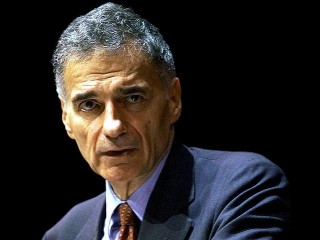
Ralph Nader biography
Date of birth : 1934-02-27
Date of death : -
Birthplace : Winsted, Connecticut, United States
Nationality : American
Category : Famous Figures
Last modified : 2010-07-15
Credited as : Lawyer and consumer advocate, ,
1 votes so far
True Believer.
Ralph Nader is both a reformer and a visionary. His roots extended to the early-twentieth-century muckrakers, to Ida Tarbell, Upton Sinclair, and others who roused the nation against business exploitation. So he launched fact-filled thunderbolts from the 1960s onward against hazardous automobiles and natural gas pipelines, unsafe mining methods, unwholesome meat processing, and other dangers to the consumers.
The Consumers' Watchdog.
Progressive magazine once hailed Nader as "Citizen of the Republic" because of his crusading efforts to protect the public; others, less sympathetic to his causes, have referred to him as the nation's nag. But whether regarded as a hero or a villain, Nader has been the country's leading consumer advocate since the mid-1960s. Yet, in an ironic twist, this defender of consumer rights is in many ways a nonconsumer. He does not own a car, lives in an inexpensive rooming house, avoids all junk food, and dresses plainly. In fact, as of 1983, he was still wearing the same pair of shoes he purchased in 1959.
David versus Goliath.
Nader was a virtually monkish idealist who was single, lived ascetically, owned no property, and cared only for the truth he was uncovering. Nader's assaults fitted the temper of the Vietnam War era and the growing assumption that the country's leaders and institutions were self-centered and deceitful. Nader's Unsafe at Any Speed: the Designed-in Dangers of the American Automobile (1965) was a smash hit, and the thin, thirtyish man became an overnight folk hero.
Background.
Nader grew up in a Lebanese immigrant family where politics was taken seriously. He went on to Princeton and Harvard Law School, where he raised doubts about the conventional argument regarding the driver's culpability in auto accidents. After practicing law in Connecticut for several years, he headed to Washington, D.C., became a consultant to the Department of Labor, and returned to his research on auto safety. In 1965 he published his findings in his book Unsafe at Any Speed. The study attacked General Motors for selling a car, the Chevrolet Corvair, that had known safety defects. The book became an immediate best-seller, and General Motors, in a move to discredit the author, hired a detective to investigate Nader's politics, religion, and sex life. When news of the investigation leaked out, the chairman of GM was forced to apologize to Nader and ultimately paid him $425,000 to drop the invasion-of-privacy suit. Nader also took his argument to Washington, D.C., where he found allies in Congress and in the Johnson administration who pushed through the National Traffic and Motor Vehicle Safety Act in 1967.
Creating an Infrastructure.
Inevitably, Nader attracted followers, often young lawyers and college students who wanted to join his consumer-rights crusade and who became known as Nader's Raiders. He strengthened the crusade in 1971 by founding a network of organizations, Public Citizen, which grew out of his Washington-based Center for the Study of Responsive Law. He also established the Corporate Accountability Research Group, financing it with the money gained from GM. Finally, from 1970 onward there was the Public Interest Research Group (PIRG), which was associated with groups in twenty-six states at the community and campus level. Nader had institutionalized his movement with a variety of watchdog, lobbying, and investigative groups that probed into both corporations and the regulatory agencies that he insisted had allied themselves with the very enterprises they were supposed to supervise. By 1971 Nader stood as the sixth most popular figure in the country, according to a Harris poll, and his position with the media was unrivaled as a reliable source of news that affected everyone. Nader helped create the Environmental Protection Agency (EPA) in 1970 and the Freedom of Information Act in 1974.
Backlash.
There was, however, a backlash against Nader's sustained critique of the American corporate structure as the 1970s wore on, conservatism increased, the economy declined, and Americans feared the loss of jobs more than the loss of health. His criticism had become familiar, his face yet another on television. In 1978 Congress narrowly failed to establish the Consumer Protection Agency, which he had advocated, and the automakers continued to stave off his attempts to impose inflatable air bags on their products. Nader's astringent, highly individualistic personality also cost him support, and it became easy to regard him as an uncompromising zealot.
A Deeper Commitment.
Behind his concern with consumerism lay a deeper commitment, that of building structures to engage Americans deeply in political action, pulling them away from political parties per se and into the realm of independent citizenship. Being a citizen has been, to Nader, the very essence of a democracy; consumer action is simply a means to that end. In 2000, Nader took that commitment to democracy to the next level when he launched a popular bid for the presidency, running on the Green Party ticket. As a write-in candidate in most states, Nader gathered a substantial number of votes. In the close race between vice-president Al Gore and Texas governor George W. Bush, some believed that Nader's presence helped decrease Gore's numbers in districts where the race was close, causing Bush to gain the winning votes.
Once again the focus of intense ire, especially among Democrats, Nader began speaking out against the Bush administration's policies. In 2004, he made another attempt to run for president, this time the support that had carried him through the previous election was non-existent as many called for him to remove himself from the running. Unparalleled in his intensity and ethics, Nader continues to struggle for the rights of individuals to safety, to education, and to a government that is responsive to the people and not to corporations.
















